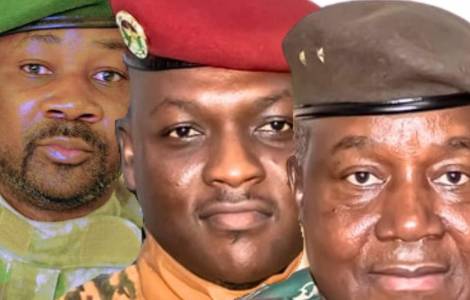
Rome (Agenzia Fides) - With the announcement last January 28 of the withdrawal of the military regimes of Mali, Burkina Faso and Niger from the Economic Community of West African States (ECOWAS), the integration process in West Africa was abruptly interrupted. Although the three countries confirmed in their joint statement that they would leave the community "with immediate effect," the community's statutes give a state a period of one year to formalize its withdrawal from the organization. The three military regimes that came to power in a coup in 2020 (Mali), 2022 (Burkina Faso) and 2023 (Niger) have tense relations with the Community, which includes 15 West African states (in addition to the three exiting states of Benin and Cape Verde, Ivory Coast, Gambia, Ghana, Equatorial Guinea, Guinea-Bissau, Liberia, Nigeria, Senegal, Sierra Leone, Togo).
Niger in particular has been hit hard by the economic sanctions imposed by the economic community after the coup in July 2023. As Rahmane Idrissa, researcher at Leiden University, explained to Fides, "the economic sanctions against Niger do not lead to political results, but have detrimental effects on the population" (see Fides 12/12/2023). "The sanctions are destroying the Nigerien economy," stressed the researcher, who added another element to understanding the junta's policies in Niamey: "Nigerians are stubborn and willing to sacrifice their economy for a nationalist pride that is ultimately misplaced. The State is struggling to pay its employees' salaries, prices have skyrocketed, but the population is not putting pressure on the junta to negotiate with ECOWAS." Under pressure from ECOWAS, the three countries ruled by the coup leaders had founded a defense pact, the Alliance of Sahel States (AES), on September 16th, whose founding act committed them to combating "terrorism" and gave them a "duty of assistance and relief" imposed in the event of aggression. By withdrawing from ECOWAS, the three States risk leaving the system of free movement and residence of persons at least for some of the 12 remaining members. Around 5 million citizens from Mali, Burkina Faso and Niger live in Côte d'Ivoire alone. There is also a large diaspora from Niger in Ghana, Togo and Benin. However, all 15 states in the community would be economically affected if the three countries leave, disrupting trade and services flows in the region worth almost $150 billion per year. However, Mali, Burkina Faso and Niger have not withdrawn from the West African Economic and Monetary Union (WAEMU), which includes some ECOWAS states (Benin, Côte d'Ivoire, Guinea-Bissau, Senegal and Togo) and in which freedom of movement and the right of residence continue to apply. The members of the WAEMU share the same currency, the African Financial Community (CFA) franc, issued by the Central Bank of the West African States (Banque Centrale des Etats de l'Afrique de l'Ouest, BCEAO). It remains to be seen whether the coup regimes decide to also withdraw from the monetary union and thus from the CFA franc and introduce a national or common currency. The rapprochement of the three outgoing states with Russia, albeit with different accents, also gives the initiative a geopolitical dimension. All three expelled French troops from their territory following their respective coups. Mali also did this with the international missions led by the UN and Europe. Bamako has welcomed a contingent of Russian mercenaries (former Wagner Group mercenaries now part of the “Afrikansky Korpus” controlled by the Moscow Ministry of Defense) to support local forces in the fight against jihadist groups and armed Tuareg in the north. Burkina Faso has just received the first hundred men of the “Afrikansky Korpus” sent by Moscow, while Niger is taking a more nuanced stance. On the one hand, the country continues to host an Italian military contingent and, above all, there are at least two American bases in the country; on the other hand, Niger is considering establishing military relations with Moscow. The region's leading country, Nigeria, views these developments with concern, not least because the announcement of the three countries' withdrawal from ECOWAS comes at a time when Nigerian President Tinubu holds the rotating presidency of the economic community. "ECOWAS is turning into a theater of confrontation between Russia and the United States. The fact that this statement came immediately after the departure of US Secretary of State Anthony Blinken from Nigeria is significant and we should pay attention to it," said former Nigerian Foreign Minister Bolaji Akinyemi in a televised debate. "We do not want to fall victim to the ongoing confrontation between Russia and NATO," he added. "I don't think what is happening now can be easily resolved because we now have this confrontation between Russia, Western countries and NATO. We should keep that in mind". (L.M.) (Agenzia Fides, 3/2/2024)